 Most Georgetown students are eagerly anticipating the upcoming long weekend as a chance to catch up on sleep, explore Washington, D.C. or return home. This cherished second Monday in October has long been celebrated in honor of Christopher Columbus, a tradition observed by the university.
Most Georgetown students are eagerly anticipating the upcoming long weekend as a chance to catch up on sleep, explore Washington, D.C. or return home. This cherished second Monday in October has long been celebrated in honor of Christopher Columbus, a tradition observed by the university.
As innocuous as this may seem, recognition of Columbus Day implicitly aligns the university with a man whose oppressive legacy contradicts core Jesuit values. The university should end this practice and instead dedicate the second Monday of October as a day of learning and remembrance in honor of those who are, to this day, impacted by Columbus’ violent legacy. A more fitting name would be Indigenous Peoples’ Day.
The horrific effects of European colonialism on American Indians are known by anyone with a rudimentary understanding of world history. Nevertheless, the dominant narrative about European arrival in North America remains one of triumphalist celebration. Holidays like Columbus Day portray European explorers as victors in a quest to discover the New World, while discounting the Americas’ existing inhabitants. This framing is indicative of a broader Western cultural insistence on marginalizing the stories and contributions of native peoples.
Throughout American culture, the perspective of Columbus and his fellow colonists is routinely told as an essential element of history. But rarely are people forced to consider the people for whom Columbus’ arrival meant enslavement, cultural extinction and death. While the name of the holiday rarely evokes such imagery, it nonetheless is symbolic of it.
It is certainly true that people cannot always recompense for the atrocities they have benefitted from. But as Americans, we should recognize that the land, power and wealth of this nation is in part grounded in the suffering of indigenous peoples. What has been taken cannot be given back. Nevertheless, conscientious men and women should embrace the chance to end the celebration of this legacy.
As it happens, Washington, D.C., is home to another movement for reinterpreting historical legacies. Many in the city and across the country are calling for the Washington Redskins to change their name, which many find racially insensitive. There is momentum for righting historical wrongs, and Columbus Day falls right within that same spirit.
To refuse to celebrate Columbus Day is a small, but necessary, part of being an ethical student of history — and especially of being a Georgetown student. This simple change in name would unquestionably better align the university with its Jesuit values. Recognition of the problem followed by a policy change is a clear use of contemplation in action. The university has a strong emphasis on combining reflection on moral issues with active solutions, and this simple shift would be a clear example of this principle.
To do otherwise, and relinquish the chance to celebrate Oct. 14 as Indigenous Peoples’ Day, would be denying the Georgetown community an opportunity to grow ethically and culturally while learning about the rich and diverse cultures of indigenous Americans, including those with representatives on the Hilltop. In order to fulfill the obligations of its Jesuit identity, Georgetown should facilitate a culture that condemns social injustice. Replacing the name Columbus Day with Indigenous Peoples’ Day is an important step toward furthering that goal.








